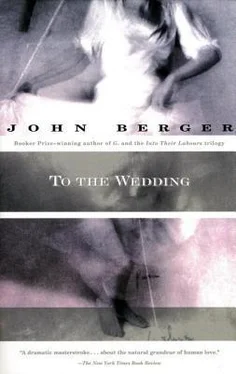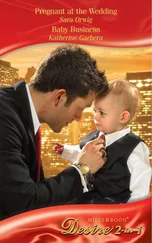John Berger - To the Wedding
Здесь есть возможность читать онлайн «John Berger - To the Wedding» весь текст электронной книги совершенно бесплатно (целиком полную версию без сокращений). В некоторых случаях можно слушать аудио, скачать через торрент в формате fb2 и присутствует краткое содержание. Год выпуска: 2011, ISBN: 2011, Издательство: Knopf Doubleday Publishing Group, Жанр: Современная проза, на английском языке. Описание произведения, (предисловие) а так же отзывы посетителей доступны на портале библиотеки ЛибКат.
- Название:To the Wedding
- Автор:
- Издательство:Knopf Doubleday Publishing Group
- Жанр:
- Год:2011
- ISBN:978-0-307-79420-8
- Рейтинг книги:3 / 5. Голосов: 1
-
Избранное:Добавить в избранное
- Отзывы:
-
Ваша оценка:
- 60
- 1
- 2
- 3
- 4
- 5
To the Wedding: краткое содержание, описание и аннотация
Предлагаем к чтению аннотацию, описание, краткое содержание или предисловие (зависит от того, что написал сам автор книги «To the Wedding»). Если вы не нашли необходимую информацию о книге — напишите в комментариях, мы постараемся отыскать её.
To the Wedding — читать онлайн бесплатно полную книгу (весь текст) целиком
Ниже представлен текст книги, разбитый по страницам. Система сохранения места последней прочитанной страницы, позволяет с удобством читать онлайн бесплатно книгу «To the Wedding», без необходимости каждый раз заново искать на чём Вы остановились. Поставьте закладку, и сможете в любой момент перейти на страницу, на которой закончили чтение.
Интервал:
Закладка:
Praying is not what I’m used to. Do I look at you? You’re looking down so I’ll do the same. She’s going to die. Die horribly after getting sicker and sicker. Defenceless. This illness isn’t like others. They don’t say this, they call it a retrovirus. As if this says it. In other illnesses death comes one day and snuffs you out. This illness, the illness of Ninon, is the job of being slowly abandoned by life. It’s the job of life letting you down, one part after another failing. Do you follow, Holy Mother of God? Her capacities go out, one by one, and there’s no night, no stars, only a cellar from which she can never walk out and in which nobody else can stay. She’s given medicines which make her ill but which stop her dying for a little while. In this little while there’s pain and time but no hope. She’s your daughter too. There’s nothing to ask for and there’s everything. Teach us how to change nothing into everything, Holy Mary. Most people look away. You don’t because you are a statue. They’re scared, I’m scared. You stay calm because you’re a statue.
How to change nothing into everything?
The test was negative, says Gino over the telephone, I’m clean.
Just keep it that way, I tell him.
I want to see you.
There’s nothing we can do, Gino.
Ninon, it makes no difference …
You say it makes no difference! My life is wiped out, and you say it makes no difference. Perhaps it makes no difference to you!
I want to see you.
No.
Once.
What for?
Friday morning. I’ll pick you up in the van at eight-thirty.
I’m working.
Take the day off!
He puts the phone down before I can reply. What do I want? Not even knowing what I want, not even knowing what I myself want, is where the loneliness begins.
Still wearing his helmet, the signalman is kneeling in the grass, his head against the rusty bottom of the door of the shrine. The words I hear now are spoken by a chorus of voices.
God is helpless. He is helpless out of love. If he had retained power he would not love as he does. Dear God aid us in our helplessness.
He gets to his feet as if he had been on his knees to look for something he had dropped. And, as he walks away, he takes off his helmet.

Gino takes me to a place called Zibello where the river is very wide, more than a kilometre across and with islands in it. We get out of his Mercedes van with all the shirts and socks in the back, and he leads me by the hand without a word to a wooden landing-stage built out over the water. Several boats are attached to it and there’s nobody there. Because of the heels of my sandals — I’m wearing my white ones — I look down at the gaps between the slats of the platform; I don’t want to trip. And there I see a dead cat floating in the water.
No, I say, get me out of here! Take me to a park or a decent café in Cremona.
Ninon, don’t get excited. I brought you here to show you something
Then be quick about it.
You see the island there?
The one where the trees come down to the water?
Yes, that’s where we’re going. We’re going to that island.
What for?
To lie with you.
It’s finished, Gino. I don’t want to fuck any more.
I’m still going to take you there.
You know I can kill you, Gino. All I need do is to smear a smear of my blood across your teeth and you’ll die a probably horrible death, a year or two after me.
Wait till we get there.
No means No for both of us, and I’m saying No.
Sit on the cushions.
The boat rocks as I climb in and makes a splashing noise. Otherwise, the river is completely silent.
It’s very low in the water, I tell him.
You know what they’re called, these boats, Ninon?
What?
They’re called barchini . The Venetians took the idea for their gondolas from here. On a river as big as the Po, you need to watch all the while where you’re going, you can’t row like an idiot and every so often glance back over your shoulder as happens in an ordinary rowboat, you have to know where you want to aim and you have to keep your eyes skinned, or the river sweeps you away as she’s taking the big tree over there, as I’ve seen her take oxen and lorries. So somebody invented the barchino which allows you to row and see where you’re going.
Gino and I are alone on the immense, opaque, yellowish sheet of water. We’re so low in the water I don’t know where the water ends. I can’t see the bank. The trunk of a big grey tree drifts past us with a bird perched on one of its branches.
Look at the bird!
It’s a sandpiper, says Gino — a piovanello .
I twist round to check where we’re heading. We are heading straight for the island.
No means No for both of us! I repeat.
He nods, but he’s concentrated on what he’s doing with the two oars. He rows standing up and he leans forward on the two oars as if he was using them as crutches. With each stroke, he somehow flicks the foot of the crutch like a dog shakes a leg dry when it comes out of the water, but Gino does the flick of the oar in the water. There’s nobody to be seen anywhere.
You come often here? I ask him.
No, not since Pedro drowned.
Drowned?
Upstream where the railway bridge crosses the Po at Cremona.
Why did he drown?
He fell in.
He couldn’t swim?
He could swim, sì .
I look at Gino. He’s still flicking each oar, one after the other, like a dog its hind leg, and he’s still standing there very tall. I put my hand in the water which strikes cold. You can’t see through it, it’s as opaque as a blanket, even milk is more transparent than this water.
When I was a kid I used to go with my father on his motorbike across the mountains where the shepherds live.
Why do I tell Gino this? I know why. Since a minute or two the barchino has changed direction, and I’ve felt a force tugging us which makes me think of the horsepower of Papa’s bike. Its pull is deep down and doesn’t vary, and its horsepower is more than anybody can reckon. I glance at the far bank and I see how we’re moving fast, whatever the water says.
We’ve missed the island, Gino. We’ve missed it.
The current is tugging the barchino downstream. Nothing can stop it. The water’s on every side now. In the mountains, glaciers do the same thing. The river is fast and the glacier is slow but nothing can stop them.
Gino, what are we doing?
We’re crossing to the island.
Suddenly I understand: he wants to kill me. He thinks it’ll be better this way. Perhaps he wants to kill us both. A suicide pact on the Po. Except it’s not a pact. He didn’t ask me.
Stop it, Gino, stop it! Get us to the bank, I want to stop!
All the while leaning on the oars like crutches, he shakes his head. Don’t be frightened, Ninon, I know what I’m doing.
His words calm me. I don’t know why. Maybe he’s lying. I shut my eyes. The immense energy of the Po, carrying us away, is like the energy of sleep when you fall into it. It’s irresistible. I know with my eyes closed tight that this is something true, not just in my head. The river air on my forehead is cold as we gather speed.
Get us to the bank! I don’t want to die.
A long time ago when I still had my eyes open, the water was flat; only when it came up against something it wasn’t carrying away at its own speed, did it form a wave. Now with my eyes closed, I feel from my hips and from the cushions I’m sitting on, that there’s a swell which monstrously rises and falls, lifting the boat and us with it. The patience of this swell is the worst, for it tells me that what is carrying us is liquid, is unstoppable and is too vast to even notice us.
Читать дальшеИнтервал:
Закладка:
Похожие книги на «To the Wedding»
Представляем Вашему вниманию похожие книги на «To the Wedding» списком для выбора. Мы отобрали схожую по названию и смыслу литературу в надежде предоставить читателям больше вариантов отыскать новые, интересные, ещё непрочитанные произведения.
Обсуждение, отзывы о книге «To the Wedding» и просто собственные мнения читателей. Оставьте ваши комментарии, напишите, что Вы думаете о произведении, его смысле или главных героях. Укажите что конкретно понравилось, а что нет, и почему Вы так считаете.












